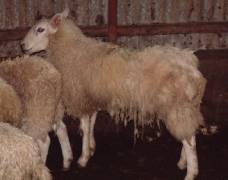All-dipped sheep sales met with note of caution

Every ewe lamb and gimmer sold at this month’s Highland Mule Breeders sale at Dingwall will have been dipped within a fortnight of the sale in a concerted effort to ensure buyers take home scab-free breeding stock.
Some 5500 Mule lambs and 1500 gimmers will go under the hammer at the 11 September event, the country’s only “all -dipped” Mule sale.
Torness producer Sandy MacPherson is one of about 50 members of Highland Mule Breeders convinced that providing buyers with guaranteed scab-free sheep is the way forward.
Mr MacPherson, who will sell 230 Highland Mule ewe lambs at Dingwall next week, runs 750 Blackface ewes on 1214ha (3000 acres) of hill, extending up to 1100ft, at Abersky and Bochruben near Loch Ness.
The Macphersons, who are also members of the Highland and Islands Sheep Health Association, were among the first producers to see the benefits of adopting a high health approach 20 years ago.
HAVOC
I’ve seen scab once in my time and I never want to see it again. It causes havoc in a flock and, aside from the welfare issue, the condition just melts off lambs,” says Mr MacPherson.
“The route we have gone down is to do as much as possible for the buyer. When he gets his sheep home he has nothing to worry about – they are ready to go.”
Mr MacPherson reckons many buyers are attracted to this sale because of the high health status of Highland Mule Breeders sheep.
“They know they are purchasing an added value, high health ewe lamb and that gives them confidence. Buyers regularly come from as far as Aberdeenshire, Perthshire and Caithness. And one buyer from Strathmore buys 300-500 head every year,” he said.
The MacPhersons dip once a year using Coopers Ectoforce water-soluble sachets. They prefer to do the dipping themselves, with help from neighbours, over two or three days.
“We’ve always dipped our sheep. It’s a simple and user friendly system and there’s no need to worry about containers,” he said.
All lambs are treated with Heptivac P and dosed with long-acting wormer within four weeks of the sale and blood tested against enzootic abortion.
Brian Hosie, of SAC Veterinary Services, applauds the Highland Mule Breeders’ enthusiasm in tackling the scab problem through the all-dipped sales initiative.
But he cautions there are some concerns about the principle of all-dipped sales. “One of the key messages in the Scottish sheep scab initiative, which we launched three years ago, is that the ultimate responsibility for controlling scab rests with the purchaser,” he says.
EXCESSIVE HANDLING
“There are opportunities for things to go awry in the dipped sale concept and another possible concern is excessive handling where purchasers also wish to dip sheep as they arrive on farm.”
 Dr Hosie urges producers to get together and co-operate in the approach to autumn, a crucial time for scab control. “Where we used to think of sheep scab as very much an autumn and spring problem, we are now getting reports of outbreaks 12 months of the year.
Dr Hosie urges producers to get together and co-operate in the approach to autumn, a crucial time for scab control. “Where we used to think of sheep scab as very much an autumn and spring problem, we are now getting reports of outbreaks 12 months of the year. “But the months of September and October are absolutely vital in tackling the problem and I would urge producers to work with their neighbours for a co-ordinated approach,” he says.
“There is no point in one farm dipping and their neighbours across the fence dipping four weeks later.”
With treatment costs of 60p – 1.20 a sheep, Dr Hosie believes a co-ordinated approach would also protect producers’ investment in preventative measures.
There have been some great success stories in sheep scab co-operation, he adds. “In several parts of Scotland, including the Lothians, the Angus Glens and Ayrshire, producers have effectively worked together to tackle scab using a co-ordinated approach.”

